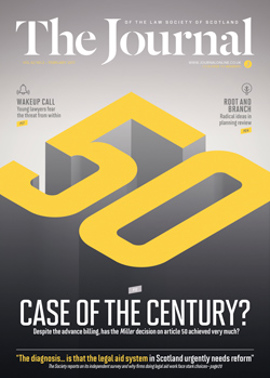Scottish Solicitors' Discipline Tribunal
David William Dickson
Two complaints were made by the Council of the Law Society of Scotland against David William Dickson, solicitor, Dicksons Solicitors, 19 Waterloo Street, Glasgow. The Tribunal found the respondent guilty of professional misconduct singly and in cumulo in respect of his delay unreasonably to respond to the reasonable enquiries of the complainers, between June 2014 and May 2016 his delay unreasonably and/or failure to timeously progress a executry, between June 2014 and May 2016 his delay unreasonably and/or failure to respond to telephone calls from the secondary complainer seeking an update in her complaint, and from 14 February 2015 to May 2016 his unreasonable delay and/or failure to contact the secondary complainer as promised despite having advised her that he would do so within 10 days of a meeting on the former date and make progress on the executry within the same period; and on the second complaint, his delay unreasonably to respond to and co-operate with the reasonable enquiries of the complainers, his failure to keep and/or ensure he had properly written up appropriate records to accurately reflect the financial position of his firm and in particular to submit the required VAT forms to HMRC timeously, and his breach of rules 6.7.1, 6.7.4, 6.13.1, 6.18.3 and 6.18.7 of the Practice Rules 2011 as a consequence of said delays and failures.
The Tribunal censured the respondent and directed in terms of s 53(5) of the Solicitors (Scotland) Act 1980 that any practising certificate held or to be issued to the respondent shall be subject to such restriction as will limit him to acting as a qualified assistant to (and to being supervised by) such employer or successive employers as may be approved by the Council of the Society or its Practising Certificate Subcommittee, for an aggregate period of two years.
The respondent had delayed or failed to deal with an executry for a significant period of time. He had failed to contact the secondary complainer despite repeated attempts on her part to obtain information. Such failure to respond would inevitably cause anxiety on the part of the client. The respondent failed to keep proper records of his accounts. He also failed to engage properly with the Society. Failure to respond to the Society hampers it in the performance of its statutory duty and brings the profession into disrepute. The respondent’s conduct in this case was not that to be expected of a competent and reputable solicitor and was serious and reprehensible.
The Tribunal found that professional misconduct was established. The Tribunal considered that the conduct was at the lower end of the scale of professional misconduct. The respondent had tendered an early plea of guilty and showed remorse. He had co-operated fully with the fiscal and the Tribunal in these proceedings. However, the Tribunal had in mind the need to protect the public.
The Tribunal awarded the secondary complainer £1,000 in compensation.
In this issue
- Miller, Brexit and BreUK-up
- Power to the people?
- Prerogatives, Parliament and the constitution: plus ça change?
- Decisions in high places
- Reading for pleasure
- Journal magazine index 2016
- Opinion: Callum Sinclair
- Book reviews
- Profile
- President's column
- Have you heard of ScotLIS?
- People on the move
- Article 50: the final say
- Where courts fear to tread
- "Wake up": how young lawyers see the future
- How healthy is our legal aid system?
- Challenging assumptions
- Planning to deliver
- Contact and the fear factor
- And the bill goes to...?
- Pakistan to join Child Abduction Convention
- Dress to impress?
- Handcuffing of prisoners and article 3
- Turning up the heat on workplace change
- Scottish Solicitors' Discipline Tribunal
- Not just for the green welly brigade
- Five by five
- Law reform roundup
- Relief over pensions and bankruptcy ruling
- Helpline plus
- Spill the beans on legal aid fraud
- The art of bringing the good news
- Cybercrime: how are you protected?
- Ask Ash
- One year rule becomes three
- From the Brussels office






